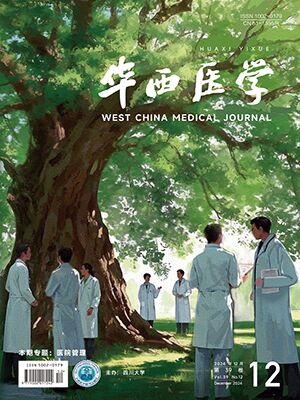| 1. |
Teasdale G, Jennet B. Assessment of coma and impaired consciousness:a practical scale[J]. Lancet, 1974, 2(7872):81-84.
|
| 2. |
胡锦, 姚海军, 刘永, 等. 华东六省一市颅脑创伤合并颅面损伤住院患者调查[J]. 中华神经外科疾病研究杂志, 2009, 8(1):47-52.
|
| 3. |
梁亮, 梁新强, 陈慧溪, 等. 中型颅脑损伤患者临床特点分析[J]. 北方药学, 2014, 11(7):132-133.
|
| 4. |
Rassovsky Y, Levi Y, Agranov E, et al. Predicting long-term outcome following traumatic brain injury (TBI)[J]. J Clin Exp Neuropsychol, 2015, 37(4):354-366.
|
| 5. |
陈炼, 吕超. 单纯性中型颅脑损伤的临床特征与预后分析[J]. 中国临床神经外科杂志, 2012, 10(10):634-635.
|
| 6. |
Mulligan RP, Friedman JA, Mahabir RC. A nationwide review of the associations among cervical spine injuries, head injuries, and facial fractures[J]. J Trauma, 2010, 68(3):587-592.
|
| 7. |
Bellamy JL, Mundinger GS, Flores JM, et al. Facial Fractures of the upper craniofacial skeleton predict mortality and occult intracranial injury after blunt trauma:an analysis[J]. J Craniofac Surg, 2013, 24(6):1922-1926.
|
| 8. |
Salentijn EG, Peerdeman SM, Boffano P, et al. A ten-year analysis of the traumatic maxillofacial and brain injury patient in Amsterdam. Incidence and aetiology[J]. J Cranio-Maxillofac Surg, 2014, 42(6):705-710.
|
| 9. |
Salentijn EG, Collin JD, Boffano P, et al. A ten year analysis of the traumatic maxillofacial and brain injury patient in Amsterdam:complications and treatment[J]. J Cranio-Maxillo-facial Surg, 2014, 42(6):1717-1722.
|
| 10. |
刘斌, 张健强, 李岩峰. 颌面骨折合并中型颅脑损伤37例早期救治分析[J]. 人民军医, 2009, 52(8):530.
|
| 11. |
Huempfner-Hierl H, Schaller A, Hierl T. Maxillofacial fractures and craniocerebral injuries-stress propagation from face to neurocranium in a finite element analysis[J]. Scand J Trauma Resusc Emerg Med, 2015, 23:35.
|
| 12. |
Stam LH, Wolvius EB, Schubert W, et al. Natural course of orbital roof fractures[J]. Craniomaxillofac Trauma Reconstr, 2014, 7(4):294-297.
|
| 13. |
李逸松, 田卫东, 李声伟, 等. 颌面创伤3958例回顾[J]. 中华口腔医学杂志, 2006, 41(7):385-387.
|
| 14. |
丁国伟, 周正炎. 面中部骨折的治疗(附87例临床总结)[J]. 口腔颌面外科杂志, 1995, 5(1):6-10.
|
| 15. |
Louis PJ. Maxillofacial Reconstruction[J]. Oral Maxillofac Surg Clin, 2013, 25(2):105-340.
|




